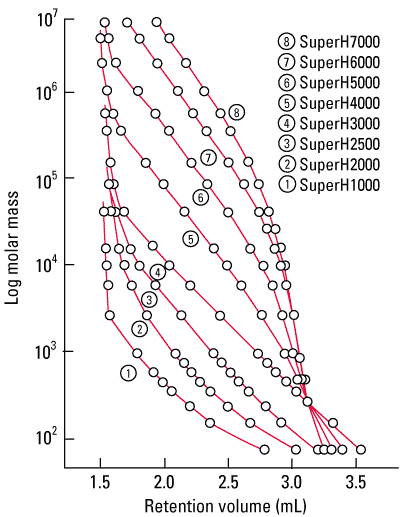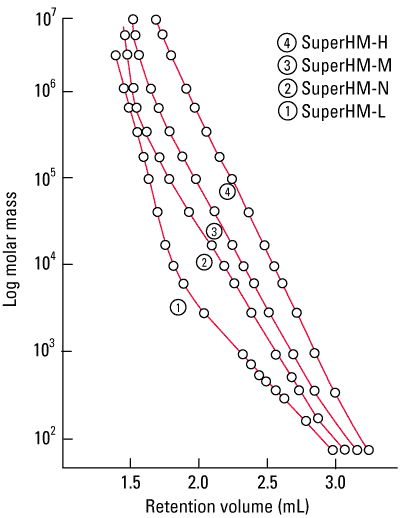TSKgel SuperH Columns
The TSKgel SuperH column line consists of eight columns with different pore sizes, TSKgel SuperH1000 through TSKgel SuperH7000, and four columns with an extended linear range of the calibration curve. The calibration curves are shown below.
TSKgel SuperH columns are high efficiency/high throughput versions of the conventional TSKgel HHR columns. The TSKgel SuperH columns are 6.0 mm ID x 15 cm. They are ideally used with EcoSEC GPC systems which are optimized for semi-micro SEC/GPC applications.
| Main characteristics: |
| Maximum operating temperature for TSKgel SuperH columns is 140 °C. |
| Broad solvent range. All TSKgel SuperH columns are shipped in THF, which can be exchanged for a wide variety of organic solvents, as shown in the Table below. |
Beware of extra-column bandbroadening
The volume of a TSKgel SuperH column is 3.4 times smaller than that of a conventional 7.8 mm ID x 30 cm column. As a result, peak volumes will be proportionally smaller on TSKgel SuperH columns compared to a corresponding TSKgel HHR column. Thus, your HPLC system may require optimization of components that can give rise to extra-column band broadening, such as connecting tubing, injector, injection volume, detector cell volume, and detector time constant.
Columns with linear calibration curves
The TSKgel SuperH product line contains four mixed bed columns, in which particles with different pore sizes are blended to provide an extended linear calibration curve. The mixed bed columns feature increasing linear calibration ranges, from TSKgel SuperHM-L, SuperHM-N, SuperHM-M, to SuperHM-H.
Calibration curves of TSKgel SuperH columns
|
  |
Column: TSKgel SuperH series, 6.0 mm ID x 15 cm
Eluent: THF
Flow rate: 0.6 mL/min
Temperature: 25°C
Detection: UV@ 254 nm
Sample: polystyrene standards |
| Shipping Solvent |
Can be replaced with |
| Tetrahydrofuran 2,3 |
acetone, ethanol, quinoline, benzene, o-dichlorobenzene, ethyl acetate, dodecane, FC-113, carbon tetrachloride, dichloromethane, dichloroethane, trichloroethane, n-hexane, cyclohexane, xylene, tetrahydrofuran, chloroform, 1,4-dioxane, hexafluoroisopropanol, toluene, 1-chloronaphthalene, dimethylaceto acetamide, methyl ethyl ketone, trichlorobenzene, m-cresol, dimethylformamide, methylpyrrolidone, o-chlorophenol/chloroform, dimethyl sulfoxide, pyridine |
Notes:
- See table below for appropriate flow rates for solvent exchange. After switching to a very polar solvent, switching to a nonpolar is not recommended.
- All TSKgel SuperH analytical columns are shipped containing tetrahydrofuran (THF).
- Prolonged exposure to carbon tetrachloride can corrode the stainless steel parts of a column and an HPLC system.
* 100% methanol cannot be used with TSKgel H-type columns; use this solvent with TSKgel SW-type or Alpha columns.
** TSKgel H-type columns may be specially ordered with this shipping solvent.
| Solvent |
Recommended Flow Rate |
| n-Hexane |
0.9 |
| methyl ethyl ketone |
0.7 |
| dichloromethane, ethyl acetate |
0.6 |
| toluene, chloroform |
0.5 |
| dimethylformamide |
0.4 |
| carbon tetrachloride, pyridine |
0.3 |
| dimethyl sulfoxide, dioxane, ethanol, N-methylpyrrolidone, o-dichlorobenzene |
0.2 |
| quinoline, hexafluoroisopropanal, 1-chloronaphthalene |
0.1 |
| Recommended Solvent |
Application |
| THF |
polystyrene, epoxy resin, phenoxy resin, polycarbonate, polyisoprene, polyvinyl acetate, polyvinyl chloride, monoglycerides, fatty acids, poly(butadiene), polybutadiene, poly(methyl methacrylate), poly(styrene-butadiene), poly(styrene-acrylonitrile) |
| N,N-Dimethylformamide (DMF) +/- 5mM LiBr |
xpolyvinyl chloride, polyvinyl fluoride, urea resins, polyurethane, polystyrene, polyester,
polyimido ether, polyimido ester, polyphenol (aqueous solution), polyacrylonitrile |
| o-Dichlorobenzene (ODCB) |
polyethylene, polypropylene |
| Chloroform |
polycarboxylic ether, acrylic resin, epoxy resin, polystyrene |
| m-Cresol/Chloroform |
nylon, polyester, polyamide, poly(ethylene terephthalate) |
| Toluene |
polybutadiene, polysiloxane |